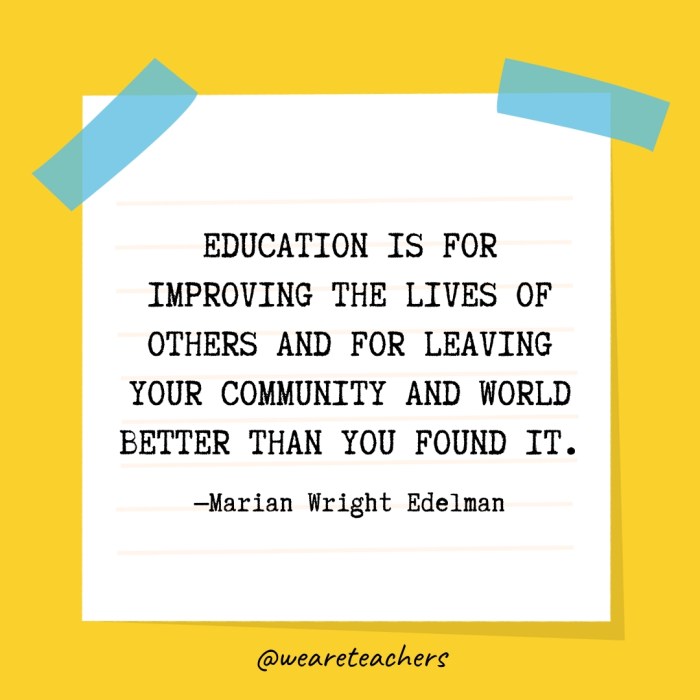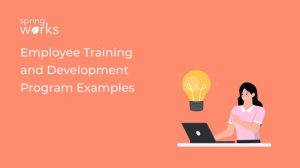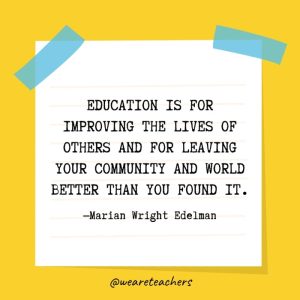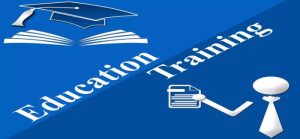
Ever wondered what the wisest minds have said about the power of learning? This journey delves into the captivating world of education and training quotes, unearthing gems of wisdom that illuminate the path to personal and professional growth. From insightful reflections on lifelong learning to the transformative impact of mentorship, we’ll explore a treasure trove of quotes that will inspire you to reach your full potential.
Get ready to be challenged, motivated, and ultimately, transformed by the power of words!
We’ll examine quotes categorized by theme – overcoming challenges, embracing innovation, and fostering collaboration – and explore how they resonate with our modern lives. We’ll even visualize some of these powerful statements, bringing their messages to life through vivid imagery. Prepare for a stimulating exploration of how education and training shape not only individual lives but also the global landscape.
The Power of Education and Training Quotes
Education and training quotes offer potent insights into the transformative power of learning, both personally and professionally. They serve as motivational tools, reminding us of the importance of continuous growth and the rewards that come with acquiring new knowledge and skills. These carefully chosen quotes illuminate the multifaceted aspects of learning, from the impact of mentorship to the joys of self-directed exploration.
Impactful Quotes on Education and Training
The following five quotes encapsulate the profound effect education and training have on personal and professional development. They highlight the crucial role learning plays in shaping our lives, building confidence, and driving success.
“The beautiful thing about learning is that nobody can take it away from you.”B.B. King
This quote emphasizes the permanence and inherent value of knowledge. Once acquired, knowledge empowers individuals, fostering independence and resilience. It underscores the importance of continuous learning, as knowledge is a lifelong asset.
“Education is the passport to the future, for tomorrow belongs to those who prepare for it today.”
Malcolm X
This quote highlights the proactive nature of education. It emphasizes the necessity of preparing for future opportunities and challenges through education and skill development. It positions education not as a luxury but as a crucial investment in one’s future.
“Tell me and I forget, teach me and I may remember, involve me and I learn.”
Benjamin Franklin
This quote stresses the importance of active participation in the learning process. Passive reception of information is less effective than active engagement and application. It champions experiential learning and collaborative approaches to education.
“Live as if you were to die tomorrow. Learn as if you were to live forever.”
Mahatma Gandhi
This quote elegantly captures the balance between appreciating the present and investing in the future. It encourages a mindset of continuous learning, recognizing its value regardless of temporal constraints. It encourages lifelong learning as a way to enrich life.
“The only person who is educated is the one who has learned how to learn and change.”
Carl Rogers
This quote focuses on the adaptability and flexibility that education cultivates. It stresses the importance of metacognition – the ability to learn how to learn – and the necessity of continuous adaptation in a constantly evolving world.
Quotes on the Importance of Lifelong Learning
In today’s dynamic career landscapes, continuous learning is no longer a choice but a necessity. The following quotes highlight the vital role of lifelong learning in navigating professional challenges and seizing new opportunities.
“Learning never exhausts the mind.”
Leonardo da Vinci
This quote speaks to the boundless capacity of the human mind to absorb and process information. It dispels the myth of mental limitations and encourages a mindset of continuous intellectual exploration. In today’s rapidly evolving job market, continuous learning is essential to remain competitive and adaptable.
“Formal education will make you a living; self-education will make you a fortune.”
Jim Rohn
This quote highlights the immense value of self-directed learning. While formal education provides a foundation, continuous self-improvement and the pursuit of knowledge beyond formal settings are crucial for achieving significant professional success. In today’s gig economy and the rise of entrepreneurship, self-education is paramount.
“The only way to do great work is to love what you do. If you haven’t found it yet, keep looking. Don’t settle.”
Steve Jobs
This quote underscores the importance of passion and purpose in lifelong learning. It encourages individuals to actively seek out learning opportunities that align with their interests and goals, leading to greater engagement and sustained effort. This resonates strongly with the modern emphasis on finding fulfilling careers and work-life integration.
Quotes on Mentorship and Self-Directed Learning
The following table presents quotes emphasizing the complementary roles of mentorship and self-directed learning in personal and professional growth.
| Mentorship | Self-Directed Learning |
|---|---|
“The dream begins with a teacher who believes in you, who tugs and pushes and leads you to the next plateau, sometimes poking you with a sharp stick called truth.”
|
“The beautiful thing about learning is that it liberates you.”
|
“A mentor is someone who allows you to see the hope inside yourself.”
|
“The more that you read, the more things you will know, the more that you learn, the more places you’ll go.”Dr. Seuss |
Categorizing Education and Training Quotes by Theme
This section delves into the categorization of ten education and training quotes, organizing them into three meaningful themes: overcoming challenges, embracing innovation, and fostering collaboration. We will explore the rationale behind each categorization, highlighting the core message each quote conveys and its connection to the chosen theme. Furthermore, we will examine the transformative power of education through a selection of impactful quotes, and finally, compare and contrast quotes that emphasize the interplay between experience and formal education in achieving professional success.
Categorization of Education and Training Quotes by Theme
Let’s begin by examining ten quotes and assigning them to one of three categories: Overcoming Challenges, Embracing Innovation, and Fostering Collaboration. The rationale for each placement will be provided.
- “Education is the most powerful weapon which you can use to change the world.”
-Nelson Mandela (Overcoming Challenges): This quote highlights education’s potential to overcome societal injustices and inequalities, representing a powerful tool for positive change and empowerment. - “The only person who is educated is the one who has learned how to learn and change.”
-Carl Rogers (Embracing Innovation): This emphasizes the continuous learning process and adaptability necessary for navigating a constantly evolving world, aligning with the theme of innovation. - “Teamwork is the ability to work together toward a common vision. The ability to direct individual accomplishments toward organizational objectives. It is the fuel that allows common people to attain uncommon results.”
-Andrew Carnegie (Fostering Collaboration): This quote clearly focuses on the power of collaborative efforts in achieving significant outcomes. - “The beautiful thing about learning is that nobody can take it away from you.”
-B.B. King (Overcoming Challenges): This emphasizes the enduring and empowering nature of education, especially in the face of adversity. - “Live as if you were to die tomorrow. Learn as if you were to live forever.”
-Mahatma Gandhi (Embracing Innovation): This quote encourages a lifelong pursuit of knowledge, essential for continuous growth and innovation. - “The mind is not a vessel to be filled, but a fire to be kindled.”
-Plutarch (Embracing Innovation): This emphasizes the active and creative nature of learning, suggesting that education should inspire curiosity and critical thinking. - “Alone we can do so little; together we can do so much.”
-Helen Keller (Fostering Collaboration): This quote directly speaks to the synergistic power of collaboration and teamwork. - “Challenges are what make life interesting. Overcoming them is what makes life meaningful.”
-Joshua Marine (Overcoming Challenges): This quote connects overcoming obstacles with finding purpose and meaning in life, directly linking challenges to the value of education and training that equip individuals to meet them. - “The future belongs to those who believe in the beauty of their dreams.”
-Eleanor Roosevelt (Embracing Innovation): This quote speaks to the importance of vision and innovation in shaping the future. - “Education is not the filling of a pail, but the lighting of a fire.”
-William Butler Yeats (Embracing Innovation): Similar to Plutarch’s quote, this emphasizes the inspirational and transformative nature of education, igniting passion and curiosity.
Transformative Power of Education Quotes
These five quotes illustrate the profound impact education has on shaping individual lives, fostering personal growth, and unlocking potential.
- “Education is the passport to the future, for tomorrow belongs to those who prepare for it today.”
-Malcolm X: This emphasizes the proactive nature of education and its role in securing a better future. - “The difference between ordinary and extraordinary is that little extra.”
-Jimmy Johnson: This suggests that education provides the tools to exceed expectations and achieve greatness. - “Knowing is not enough; we must apply. Willing is not enough; we must do.”
-Johann Wolfgang von Goethe: This highlights the practical application of knowledge gained through education and training. - “I have learned that success is to be measured not so much by the position that one has reached in life as by the obstacles which he has overcome while trying to succeed.”
-Booker T. Washington: This connects overcoming challenges with the definition of success, demonstrating education’s role in building resilience. - “The only limit to our realization of tomorrow will be our doubts of today.”
-Franklin D. Roosevelt: This suggests that education empowers individuals to overcome self-doubt and achieve their full potential.
Comparison of Quotes on Experience vs. Formal Education
These three quotes highlight the ongoing debate about the relative importance of experience and formal education in professional success.
- “Experience is the best teacher.”
-Anonymous: This emphasizes the practical knowledge gained through real-world application and challenges. - “Formal education will make you a living; self-education will make you a fortune.”
-Jim Rohn: This suggests that formal education provides a foundation, but continuous self-learning is key to exceptional success. - “The best minds are not always in the best places, but the best places always need the best minds.”
-Unknown: This quote implies a need for both experience and formal education, recognizing that both are crucial for success in the right environment. It doesn’t favor one over the other, suggesting a synergistic relationship.
Visual Representations of Education and Training Quotes

Visualizing impactful quotes enhances their memorability and understanding. By translating the abstract concepts within these sayings into concrete images, we create a more engaging and lasting impression on the audience. This section explores how three powerful quotes about education and training can be brought to life through visual representation.
Visual Representation of “The only person who is educated is the one who has learned how to learn.”
This quote emphasizes the ongoing, self-directed nature of learning. The image illustrating this would depict a person standing at the base of a vast, winding staircase that ascends into the clouds. The staircase is not a rigid, pre-defined path, but rather a series of interconnected, sometimes diverging, pathways, representing the diverse and evolving nature of learning. The person’s expression is one of curiosity and determination, not fear.
The clouds above symbolize the limitless potential of knowledge. The colors would be bright and optimistic, with a focus on blues and greens to represent growth and the sky’s limitless expanse. The overall composition conveys a sense of journey and continuous progress, rather than a fixed destination. The focus remains on the individual’s active participation in the learning process.
Visual Representation of “Education is the passport to the future, for tomorrow belongs to those who prepare for it today.”
This quote speaks to the importance of proactive learning and its impact on future success. The visual representation would be a vibrant, dynamic scene. A young person, perhaps a diverse group of young people, stands at a crossroads. One path is dark and indistinct, leading into a shadowy unknown. The other path is brightly lit, leading towards a futuristic cityscape filled with innovative technology and vibrant, diverse people.
This brighter path is lined with symbolic representations of education – books, graduated caps, and glowing digital interfaces. The color palette is crucial: warm, inviting oranges and yellows for the path to the future, contrasting with cool, muted grays and blues for the path of unpreparedness. The cityscape itself should be modern and optimistic, suggesting possibilities and opportunities. The overall feeling should be one of hope, empowerment, and the promise of a brighter future through education.
Visual Representation of Continuous Learning
The concept of continuous learning can be visually represented as a perpetually turning wheel or a constantly flowing river. Imagine a wheel with segments representing different skills, knowledge areas, and experiences. Each segment is subtly different, reflecting the diverse nature of learning. The wheel is in constant motion, never stopping, implying the continuous acquisition and application of new knowledge.
The colors could be a gradient, starting from a muted tone at one point, gradually shifting to a brighter hue, illustrating the accumulation of knowledge and experience. Alternatively, imagine a river flowing steadily onward, its current carrying leaves (representing acquired knowledge) that are constantly being replaced with new ones. The river flows towards a distant, bright horizon, symbolizing future possibilities.
This image, whether the wheel or the river, visually communicates the dynamic and ongoing nature of continuous learning, emphasizing its iterative and ever-evolving character.
The Impact of Education and Training on Different Aspects of Life
Education and training are transformative forces, shaping individuals, economies, and societies. Their impact resonates across various facets of life, fostering personal growth, driving economic prosperity, and enhancing global competitiveness. Examining how education and training quotes illuminate these effects provides a powerful lens through which to understand their profound influence.
Education and Training’s Influence on Personal Growth and Self-Improvement
Inspiring quotes about education and training often highlight the power of learning to unlock individual potential. For instance, the quote “The only person who is educated is the one who has learned how to learn” emphasizes the lifelong journey of self-improvement. This encourages a growth mindset, motivating individuals to continually seek new knowledge and skills, leading to increased confidence, adaptability, and overall well-being.
Another example, “Live as if you were to die tomorrow. Learn as if you were to live forever,” underscores the importance of continuous learning as a crucial element of a fulfilling life. This quote suggests that personal growth isn’t just about accumulating knowledge; it’s about embracing a lifelong pursuit of learning, leading to greater self-awareness and a richer, more meaningful existence.
The impact is demonstrable: individuals who actively engage in learning tend to exhibit greater resilience, problem-solving skills, and a broader perspective on life.
The Role of Education and Training in Fostering Economic Growth and Societal Progress
Education and training are cornerstones of economic development and societal advancement. A highly skilled workforce is essential for innovation, productivity, and competitiveness. Consider the quote, “Education is the most powerful weapon which you can use to change the world,” which highlights the transformative potential of education in driving societal progress. This is supported by the fact that countries with higher levels of education and training generally experience higher rates of economic growth and improved living standards.
Furthermore, “The illiterate of the 21st century will not be those who cannot read and write, but those who cannot learn, unlearn, and relearn” emphasizes the adaptability and continuous learning required in today’s rapidly changing economic landscape. This quote underscores the need for continuous upskilling and reskilling to remain competitive and relevant in the workforce. Finally, the quote “Invest in knowledge for it will never fail you” underscores the long-term economic benefits of education and training, positioning them as sound investments for both individuals and nations.
These investments translate into higher earning potential, increased tax revenue, and a more robust and innovative economy.
Education and Training’s Influence on Global Competitiveness
In today’s interconnected world, global competitiveness hinges on a nation’s human capital. Industries across the spectrum, from technology to healthcare, require highly skilled professionals. The quote “The future belongs to those who learn more skills and adapt changes faster” encapsulates the importance of continuous learning and adaptation in a globally competitive environment. This is evident in the tech industry, where constant innovation demands a workforce capable of mastering new technologies and adapting to rapid changes.
Similarly, the healthcare sector relies on continuous education and training to ensure practitioners are equipped with the latest medical advancements and best practices. The automotive industry, another example, necessitates constant upgrades in manufacturing processes and technological advancements, requiring a skilled workforce capable of embracing these changes. Without continuous investment in education and training, nations risk falling behind in the global race for innovation and economic dominance.
The quote “Education is the passport to the future, for tomorrow belongs to those who prepare for it today” further emphasizes the crucial role of education and training in securing a nation’s future competitiveness on the global stage. This forward-looking perspective highlights the strategic importance of investing in human capital as a key driver of national prosperity and global influence.
Exploring the Phrase “Education and Training”
The terms “education” and “training” are often used interchangeably, but they represent distinct yet interconnected processes crucial for personal and professional development. While both contribute to skill acquisition and knowledge enhancement, their approaches, goals, and long-term impacts differ significantly. Understanding these nuances is vital for making informed decisions about personal and professional growth strategies.Education and training, while often overlapping, possess unique characteristics.
Education focuses on broader knowledge acquisition, critical thinking, and the development of cognitive skills applicable across various contexts. It emphasizes theoretical understanding and the cultivation of intellectual curiosity. Training, on the other hand, is more focused and practical, aiming to develop specific skills for immediate application within a particular job or task. For example, a university degree in engineering provides a broad education in engineering principles, while on-the-job training might focus on using specific software for CAD design.
The intersection occurs when educational foundations inform and enhance the effectiveness of training, and vice versa; practical training reinforces and contextualizes theoretical knowledge gained through education.
Formal Education versus On-the-Job Training: A Comparison of Benefits
The choice between formal education and on-the-job training often depends on individual goals and circumstances. Both offer valuable benefits, but they cater to different needs and learning styles.
- Formal Education:
- Provides a broad theoretical foundation and critical thinking skills applicable across diverse fields.
- Offers structured learning environments with established curricula and qualified instructors.
- Leads to recognized credentials (degrees, certificates) that enhance career prospects.
- Facilitates networking and collaboration with peers and faculty.
- May involve more extensive and in-depth study compared to on-the-job training.
- On-the-Job Training:
- Provides practical, hands-on experience directly applicable to a specific job role.
- Offers immediate application of learned skills and faster skill development.
- Allows for personalized learning tailored to the specific needs of the workplace.
- Provides opportunities for mentorship and direct feedback from experienced professionals.
- Can be more cost-effective than formal education in terms of time and financial investment.
Key Differences in the Goals of Education and Training
The fundamental objectives of education and training diverge, shaping their respective approaches and outcomes.
- Goal 1: Breadth vs. Depth of Knowledge: Education aims to provide a broad understanding of a subject area, fostering critical thinking and problem-solving abilities. For instance, a history degree equips students with a broad understanding of historical events and processes, enabling them to analyze and interpret information critically. Training, conversely, focuses on in-depth mastery of specific skills needed for a particular job, such as proficiency in a specific software program or a particular manufacturing technique.
A software training course would focus on the practical application of that specific software, not the broader history of software development.
- Goal 2: Long-Term vs. Short-Term Application: Education cultivates knowledge and skills for long-term application across various contexts. The knowledge gained from a medical degree, for example, serves as a foundation for a lifelong career in healthcare, adapting to advancements and changes in the field. Training, in contrast, often focuses on immediate application of skills relevant to a current job. A training course on using a specific cash register system is geared towards immediate practical application in a retail setting, not necessarily preparing for future roles.
- Goal 3: Intellectual Development vs. Skill Acquisition: Education prioritizes intellectual development, critical thinking, and the ability to learn and adapt. A philosophy degree fosters critical thinking skills applicable across various disciplines, not just philosophy. Training emphasizes skill acquisition and the development of practical competencies directly related to job performance. A welding training program focuses on developing the practical skills required to perform welding tasks proficiently, emphasizing precision and safety.
End of Discussion

So, as we conclude this exploration of insightful education and training quotes, remember that the journey of learning is a lifelong adventure. These quotes serve as guiding stars, reminding us of the transformative power of knowledge, the importance of continuous growth, and the profound impact education has on individuals and society as a whole. Embrace the wisdom shared, and let it fuel your own pursuit of excellence.
Answers to Common Questions
What’s the difference between education and training?
Education focuses on broader knowledge and skill development, often theoretical, while training emphasizes specific skills for a particular job or task, usually practical.
Are there quotes specifically for different age groups?
While many quotes apply broadly, some resonate more strongly with certain age groups. For example, quotes about lifelong learning might particularly resonate with older adults, while quotes on the importance of foundational education might resonate more with younger learners.
Where can I find more education and training quotes?
Numerous books, websites, and online databases dedicated to quotations offer a vast collection. Searching by s like “education,” “training,” “learning,” or specific themes will yield many results.
How can I use these quotes in my own work or presentations?
Use quotes to inspire, illustrate points, or add a touch of wisdom to your presentations, articles, or social media posts. Always cite the source properly.






